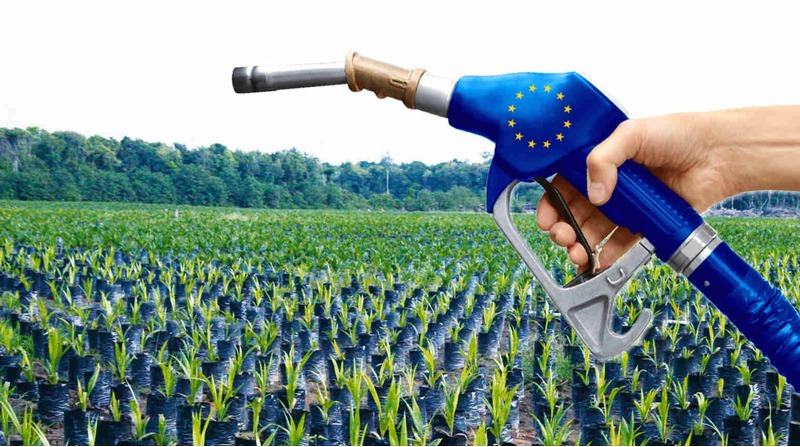
A fresh row has erupted in Brussels over the environmental benefits of biofuels, with academics and EU officials at loggerhead over how to account for CO2 savings in the product's life cycle.
A group of 19 European scientists have argued that the EU's biofuels policy was based on a «serious accounting error» and should be changed, triggering a row with the European Commission, which defends biofuels for being «carbon neutral».
The row began with the leaking of an opinion by the Scientific Committee of the European Environment Agency (EEA) last week.
The report eviscerates the official EU stand that biofuels are environmentally beneficial, as an accounting error with «immense» potential consequences.
The EU says that the carbon absorbed by biofuel plants when growing offsets their CO2 emissions when burned.
«The CO2 emitted from burning biofuels is assumed to be carbon neutral, as the carbon was taken out of the atmosphere when the biomass grew. It therefore does not add carbon to the atmosphere, as this carbon is part of the existing carbon cycle,» an EU official told EurActiv in an email.
But the panel of 19 EEA scientists decided that this neglected the fact that other carbon-absorbing plants would have grown in the biofuels place, if the land was fertile, and so any carbon absorption from the biofuels was being «double-counted».
«What comes out the tail pipe of a car is real carbon dioxide, whether you’re burning biofuel or diesel,» an academic associated with the study said. «You get the benefit from plant growth [but] land grows plants anyway, whether you’re using them for biofuels or not.»
EU Commission says study 'flawed'
The row has illustrated disagreements between scientists and the European Commission over the environmental benefits of biofuels.
Marlene Holzner, spokeswoman for EU Energy Commissioner Günther Oettinger, told the New York Times that the findings of a Princeton University researcher, Tim Searchinger, which underpinned the EEA study, were flawed.
The findings have been «rebutted by other institutions,» Holzner said, adding the researcher's opinion «seems not to be an actual good contribution» to the biofuels debate. Holzner explained to EurActiv that Searchinger's view had been criticised by a report compiled by Econometrica because he did not compare CO2 emissions from biofuels to those from petrol.
«This is the most important thing for us because people won't keep their cars in the garage even if we tell them to,» she said. «If you use biofuels you save a lot of CO2 compared to petrol. He has been criticised [because] he does not make this comparison.»
But, contacted by EurActiv, Searchinger professed «surprise» at Holzner's intervention, which he suggested was at variance with other officials' views in the Commission's energy directorate.
«That's not true,» he said. «The whole point of the analysis was to make that comparison – detail for detail. If biofuels cause the same or more greenhouse gas emissions than petrol, then the very fact that people drive them is exactly the point: that biofuels will not reduce their emissions, and may increase them.»
'Plausible' increases in emissions
Recent reports by the EU's Joint Research Centre (JRC) and the International Food Policy Research Institute (IFPRI) had also concluded that biofuels would increase CO2 output, he said.
«The plausible scenarios range from small benefits for crop-based biofuels compared to gasoline up to large increases in emissions,» Searchinger added.
A recent study for the EU by the International Food Policy Research Institute showed that bioethanol had a smaller impact than biodiesel on land use.
«If you really want sustainable biofuels, you should look to move bioenergy crops away from prime agricultural land into unused degraded land that is not so fertile,» Nusa Urbancic, a spokesperson for the environmental group Transport and Environment, told EurActiv.
For Lars Hansen, president of Novozymes, a European biofuel manufacturer, the key issue was whether biofuels emitted less CO2 than petrol. «Assuming that land use issues are accounted for,» he said, «there is clear and substantial evidence that they do.»
Such assurances are unlikely to stem the growing disquiet over biofuels.
«The industry can deny whatever they want but the key words there are 'assuming that land use issues are accounted for',» Searchinger said. «The problem is that right now we don't account for land use at all.»
Arthur Neslen
Positions:Robbie Blake, the biofuels spokesman for Friends of the Earth told EurActiv: «All of the scientific reports are showing that the carbon benefits of biofuels as well as bioenergy are increasingly doubtful. It seems to me that these eminent groups of scientists can't be ignored so easily and we should take note of what they are saying, particularly in its uncensored form.»
In a statement emailed to EurActiv, Lars Hansen, the president of Novozymes said: «The impact of carbon stored in the ground is accounted for in the biofuels Life-Cycle Analysis, annualised over 20 years. These calculations are based on the IPCC guidelines. In addition, EU sustainability criteria prevent the conversion of high carbon stock areas such as forests. Therefore the EU RED already takes into account these emissions or prevent them».
«In the transport sector, biofuels are the only viable alternative to fossil fuels on the short and medium term. And, advanced biofuels made from residues or waste hold the potential to reduce CO2 emissions with 90% compared to gasoline».
Image Upload
Add image